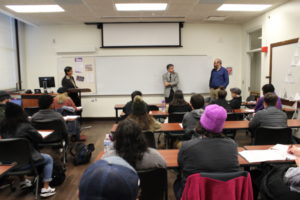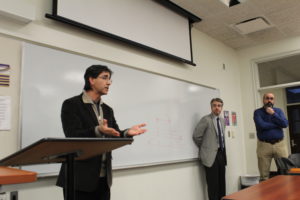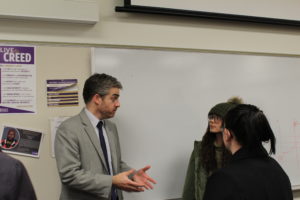
Students and community members listening to the panel. Photo by Jillian Kassor.
Western Carolina University opened up a panel about immigration and the Latino vote featuring WCU’s own Dr. Benjamin Frances-Fallon, history professor, and a guest from Jacksonville University in Florida, Dr. Jorge Majfud.
“I never felt myself as Latino or Hispanic until I came to the United States. It is the United States that created the “otherness,” Majfud said when opening his portion of the event.
Majfud went into a discussion about how the Latino vote has impacted many things, for example, the Latino population is much more concentrated in larger cities because Latinos who are living in more rural areas are dramatically underrepresented in the government and have significantly less power.
Majfund went on to talk about who was considered American. “If you were not white enough then you were not considered American enough. This idea that you must be white to be an American has loosened, but not nearly enough,” Majfud said.
This event was held on Jan. 30 in McKee and was hosted by DegreePlus. Among the 46 people in the room, there were men and women of all ages, races, and ethnicities from our campus and community.
“It was exciting to listen to their point of views I am open minded and very curious. I came for extra credit, but I also did see the flyers and it is an interesting topic because immigration is a big deal, it always has been, but it is a more widely talked about issue now, especially in this country,” Alejandra Céspedes, junior at WCU, said.
Dr. Alberto Centeno-Pulido, WCU professor of Spanish, helped orchestrate and introduced the event as he knew Majfud from graduate school and was excited about being able to represent this year’s campus theme, Defining America from a non-white perspective.
“Diversity is a constant work in progress, but I guess we have to start somewhere, and I would like to think of this event as a contribution to a dialogue that we are trying to develop as an institution. I thought it would be interesting to bring another viewpoint in,” Centeno-Pulido said.

Benjamin Frances-Fallon, Jorge Majfud and Alberto Centeno-Pulido talking to WCU students and community members. Photo by Jillian Kassor.
Frances-Fallon kicked off the conversation by providing the audience with a little bit of history about the emergence of the “Latino vote.” He is well versed in the topic and has been working on a book for nearly 10 years about the “Latino vote” and argues that political organizing was a key factor in defining and institutionalizing the current ideas of Latino identity in the United States. The book is scheduled for release this fall.
Immigration is one issue of many, as Frances-Fallon explained. In the 1970s there was a surge of undocumented immigrants which led to aggressive policing and more intense border control, then leading to racial profiling.
For example, employers were getting into trouble with law enforcement for hiring undocumented workers so to protect themselves employers stopped hiring Latino people in fear that they were undocumented. How did they know if the Latino population that was applying for these jobs were undocumented or not? They didn’t. So, they discriminated against all Latinos.
The public image of the demographic became associated with illegality. There are many issues with this mindset, but first and foremost, criminalization statistics are very clear; immigrants, even those who are illegal, have a much lower rate of criminality.
Towards the end of Majfud’s discussion, he said, “We need to stop the hate rhetoric of the weakest minority.” It was easy to see that this touched many of the people in attendance as for the next 15 minutes afterwards students and community members came up to give their thanks and ask a few questions to Majfud and Frances-Fallon.

Benjamin Frances-Fallon taking questions after the event. Photo by Jillian Kassor.
“It is important to stimulate conversations like these with our students and our community in order to show the world we are alive and exist beyond this campus,” Frances-Fallon said bringing the event to a close, but surely not closing the hearts and minds of our students and community members.
The next event featuring this year’s campus theme, Defining America, is on Feb. 21 from noon to 10 p.m. in the U.C. Theater for a discussion with Rasul Mowatt, American Studies professor at the Indiana University Bloomington. The conversation will be about his work on analyzing lynching photography for examples of violence as a form of leisure, perceived notions of racial identity in community recreation centers, the complexities of visitation to Ghanaian Slave Castles and alternative treatment for veterans with PTSD.



